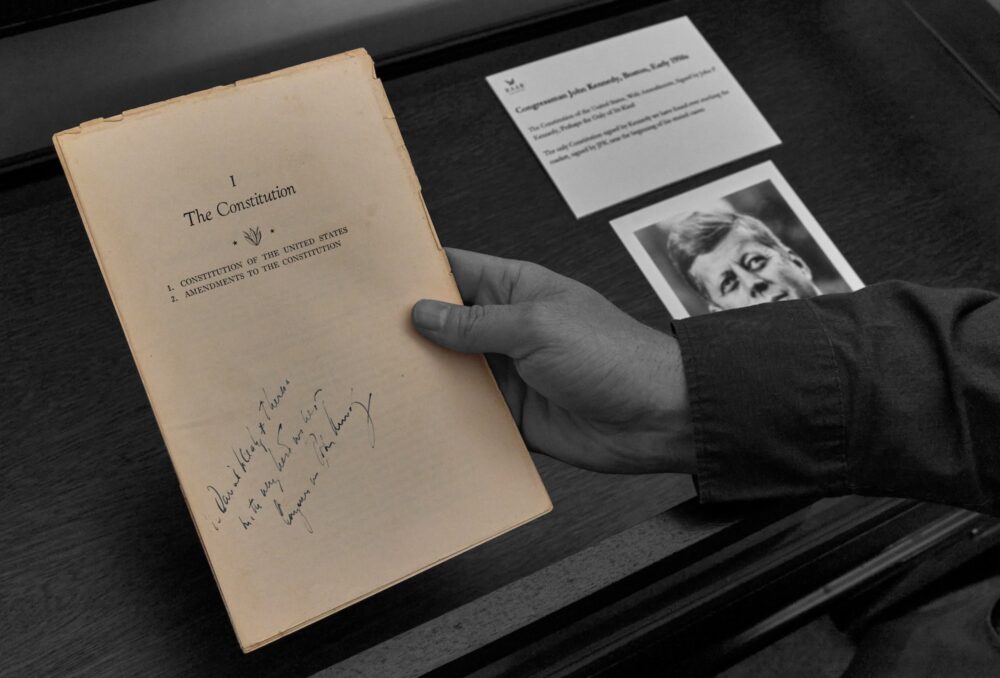Research discloses no copy of the Constitution signed by John F. Kennedy ever having reached the public market before
On exhibit at Raab, May 6-10
The Raab Collection announces that it has discovered, acquired, and is offering for sale a copy of the U.S. Constitution signed by John F. Kennedy in the early 1950s, at the dawn of JFK’s storied career in politics. He signs as “Congressman John Kennedy.” This historical document has never been offered for sale, and indeed is the only one of its kind that we’ve ever seen. It is priced at $55,000.
This rare and perhaps unique copy of the Constitution, signed by Kennedy, will be on display at Raab for a week starting May 6.
Raab acquired this document from the descendants of the recipient, then a college student in South Boston, who had attended a political speech there in the 1950s. At that event, John F. Kennedy inscribed and signed this copy of the Constitution for him. This document has never been offered for sale before.
John F. Kennedy’s Early Political Career
JFK’s interest in politics may stem from his father’s appointment as a U.S. Ambassador to England in 1937. At the time, John was a student at Harvard with an interest in foreign affairs. Soon after graduation and the onset of World War II, he joined the Navy and became commander of a patrol torpedo boat, the PT-109, in the South Pacific.
When the war ended, JFK’s father convinced him to run for Congress in Massachusetts’ eleventh congressional district, where he won in 1946. He served three terms (six years) in the House of Representatives, and then, in 1952, he was elected to the US Senate.
The young war hero became a popular politician. He was nearly picked to run for vice-president on the Democratic ticket in 1956, but he ran instead for president in 1960, with Lyndon B. Johnson, then a senator from Texas, as his running mate. On November 8, 1960, Kennedy defeated Richard M. Nixon in a very close race. He was both the youngest man elected president and the first Catholic.

On January 20, 1961, Kennedy was sworn in as the 35th president. In his inaugural speech he implored Americans to be more active citizens. “Ask not what your country can do for you, ask what you can do for your country,” he said.
During his almost three years in office, Kennedy created the Peace Corps, bolstered the space program, and proposed a new Civil Rights bill.

JFK and the Constitution
The U.S. Constitution meant a great deal to John F. Kennedy, and he spoke of it often.
During the 1960 presidential election campaign, he articulated his long-held feelings about the U.S. Constitution: “The greatness of our Constitution comes not so much from the words that it contains. It is great because of the people who have lived and worked under it to add to its framework of words and ideas the work and sacrifice and passionate devotion of many generations of Americans…. Our Constitution is founded on the principle that all men are equal as citizens, and entitled to the same rights, whether they achieved citizenship by birth, or after coming here as immigrants, seeking to find in America new freedom and new opportunities.”
As president, he proclaimed, “For in a government of laws and not of men, no man, however prominent or powerful, and no mob however unruly or boisterous, is entitled to defy a court of law. If this country should ever reach the point where any man or group of men by force or threat of force could long defy the commands of our court and our Constitution, then no law would stand free from doubt, no judge would be sure of his writ, and no citizen would be safe from his neighbors.”
Kennedy Historical Documents & Autographs
Although JFK’s presidency was cut short by an assassin in 1963, a variety of historical documents and autographs remain to illuminate Kennedy’s political career. To peruse a selection of them, visit our dedicated Kennedy page.







































































































